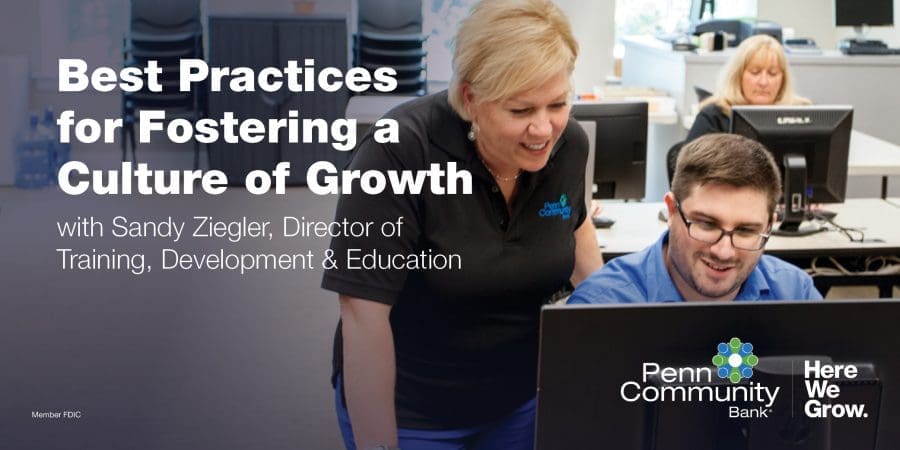
By Sandy Ziegler – Director of Training, Development & Education
Throughout our lives, we’ve all had people who have taught us lessons. Once in a while, a special person appears to give us more; a person who invests in a relationship and commits to growing a colleague personally or professionally. This authentic relationship – and the benefits it yields – is at the core of mentorship.
At Penn Community Bank, we understand that investments in our people are critical to paving the road to success, both personally and professionally. Our robust team member training and development programs encourage individuals across the organization to draw from each other’s expertise through mentor-mentee relationships. The skills and unique knowledge that our employees can share with each other within the culture of the bank’s teamwork-based, collaborative environment are things that foster the mission-driven banking we deliver to our community.
We’ve experienced the organizational benefits of promoting mentorship, ranging from finding creative solutions to old problems, leveraging the power of diversity, and, one of the most rewarding benefits, increased employee retention. This final point is crucial to any business as the average cost of replacing a departing employee can be 90% to 220% of that person’s base salary –that adds up quickly for organizations with a revolving door of employees.
Whether you are a lawyer, a manufacturer, or a banker, the power of mentorship crosses all industries. And, it’s never too late to start. Effective mentoring is a two-way trusted relationship where both the mentor and mentee will learn and grow personally and professionally. There is no age limit for receiving advice – everyone needs mentors if they want to grow and evolve.
Best Practices for Building and Leveraging a Mentorship Program
At Penn Community Bank, these are some of the best practices we follow to ensure that our mentors and mentees gain the most out of their relationship, and that the organization can reap benefits, as well:
- Match mentors and mentees with purpose. In determining which employees to pair together for a mentor-mentee relationship, there are many factors to take into consideration, including geographic location, departmental role, previous experience, out-of-office interests and hobbies, and personal and professional aspirations. But also keep an open mind: Some of the best pairings may seem unlikely at face value.
- Provide program structure while remaining flexible. It can be beneficial to provide a framework in which mentors and mentees can build their relationships, such as through educational programs and trainings on how to optimize the pairing. However, too much structure may stifle the natural progression the relationship could take. Rather than rigid requirements of each pair, many mentors and mentees thrive when provided a list of suggested discussion topics or activities on which they can collaborate.
- Track your program’s success. Identify what a successful mentorship program will produce for your participants and the organization, and then choose measurable ways to quantify progress. These metrics may include the duration of the relationship, participants’ tenure with the organization, participants’ career trajectory, or employee satisfaction with the program.
Tips for Mentors and Mentees
Whether you are a mentor or a mentee, here are some helpful tips to ensure you’re maximizing your relationships and programs:
- Always put the relationship first. Focus on developing character, not just competency.
- Be openly optimistic and forward looking. Avoid dwelling on grievances or small setbacks.
- Share and receive specific advice, but be receptive to the input or questions. You’re never too old to learn.
- Be considerate to your mentor and mentee and be prepared to commit to the time and effort needed for a successful relationship.
- The mentoring relationship is a personal one, keep it confidential.
Resources
There are thousands of resources for individuals or businesses looking to begin or deepen mentorship relationships. Among my favorite resources are Mentoring 101 by John Maxwell and The Coaching Habit by Michael Bugay Stanier. For non-book learners, Shirley Liu delivers an excellent TED Talk entitled Why the Power of Mentoring can Change the World.
National Mentoring Day is the perfect time to reflect on and recognize the importance of mentorships in the workplace and the value that it can create for businesses. By creating a positive culture that puts key values into action, including through a mentorship program and other professional development initiatives, businesses and individuals can be confident about their personal and organizational growth.


